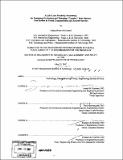| dc.contributor.advisor | Joseph M. Sussman. | en_US |
| dc.contributor.author | McConnell, Joshua B. (Joshua Bryan), 1974- | en_US |
| dc.contributor.other | Massachusetts Institute of Technology. Technology, Management, and Policy Program. | en_US |
| dc.date.accessioned | 2009-01-30T18:34:05Z | |
| dc.date.available | 2009-01-30T18:34:05Z | |
| dc.date.copyright | 2007 | en_US |
| dc.date.issued | 2007 | en_US |
| dc.identifier.uri | http://dspace.mit.edu/handle/1721.1/39334 | en_US |
| dc.identifier.uri | http://hdl.handle.net/1721.1/39334 | |
| dc.description | Thesis (Ph. D.)--Massachusetts Institute of Technology, Engineering Systems Division, Technology, Management, and Policy Program, 2007. | en_US |
| dc.description | Includes bibliographical references. | en_US |
| dc.description.abstract | Designing a flexible system with real options is a method for managing uncertainty. This research introduces the concept of "complex" real options, which are composed of interconnected echnological, organizational and process components. "Complex" real options differ from the "standard" real options described in the literature in the option life-cycle activities of design, evaluation and management. To address the challenges posed by "complex" real options, the Life-Cycle Flexibility (LCF) Framework was created. The framework addresses issues along the entire life-cycle of an option, in both technical and social system dimensions. Two case studies were considered in this research to better understand "complex" real options and test the LCF Framework: 1) a large blended wing body aircraft in a commercial aircraft manufacturing enterprise and, 2) Intelligent Transportation System (ITS) capabilities in an urban region with multiple public and private stakeholders. For the case studies, both a quantitative and qualitative analysis was completed. System dynamics and traffic demand models were used to quantitatively evaluate flexibility for each case study. Forty interviews with practitioners were conducted to better understand the practical challenges associated with flexible systems. | en_US |
| dc.description.abstract | (cont.) This research found that there are significant differences between "standard" and "complex" real options. In the design phase, enterprise architecture issues must be considered either as a precursor or simultaneously with the design of the option. In the evaluation stage, option valuation techniques more sophisticated than those found in the real options literature were needed to value the "complex" real options. In the management stage, political considerations were of great importance as political opposition could prevent option exercise from occurring. Without the LCF framework, existing processes for evaluating real options are not adequate for taking into account the interacting technical, organizational and process components of 'complex" real options. In summary, this research provides new insights into the design, evaluation and management of "complex" real options. | en_US |
| dc.description.statementofresponsibility | by Joshua Bryan McConnell. | en_US |
| dc.format.extent | 465 p. | en_US |
| dc.language.iso | eng | en_US |
| dc.publisher | Massachusetts Institute of Technology | en_US |
| dc.rights | M.I.T. theses are protected by
copyright. They may be viewed from this source for any purpose, but
reproduction or distribution in any format is prohibited without written
permission. See provided URL for inquiries about permission. | en_US |
| dc.rights.uri | http://dspace.mit.edu/handle/1721.1/39334 | en_US |
| dc.rights.uri | http://dspace.mit.edu/handle/1721.1/7582 | en_US |
| dc.subject | Technology, Management, and Policy Program. | en_US |
| dc.title | A life-cycle flexibility framework for designing, evaluating and managing "complex" real options : case studies in urban transportation and aircraft systems | en_US |
| dc.type | Thesis | en_US |
| dc.description.degree | Ph.D. | en_US |
| dc.contributor.department | Massachusetts Institute of Technology. Engineering Systems Division | |
| dc.contributor.department | Technology and Policy Program | |
| dc.identifier.oclc | 173517996 | en_US |
